"Society is a masked ball, where every one
hides his real character, and reveals it by hiding." |
Ralph Waldo Emerson |
The term 'cautionary tale' is often used in narratives flooded with warning signs, where behaviour or events both dangerous and tragic, are flagged up to the audience to prove a point and show how easily fate can twist and turn to change a person irrevocably. Sometimes, these signs highlight failures, maltreatment or forms of injustice, such as those featured in Alan Clark's Scum, Ken Loach's Ladybird, Ladybird and Cathy Come Home, or, more recently, Samantha Morton's The Unloved. But other films, such as Gillies MacKinnon's Small Faces or Loach's Sweet Sixteen, highlight just how slight the degree of separation been a good person and a bad one actually is.
In the case of Peter Mullan's Neds (sometimes alternatively styled as NEDS), the tale is one of extreme caution, and the degree of separation is paper thin.
Neds is the multi-talented Mullan's third feature, and marks his return to the director's chair after an eight year break, following his earlier successes with Orphans and the multi-award winning The Magdalene Sisters. Like its predecessor, Neds is an incredibly powerful and sometimes incredibly brutal film, which relates another kind of dark history: the adolescence of John McGill (first played by Gregg Forrest, and then by Conor McCarron); tracing his journey from gifted young boy full of promise, and with aspirations to be a journalist and attend university, to young man with ever-decreasing prospects, facing an uncertain future.
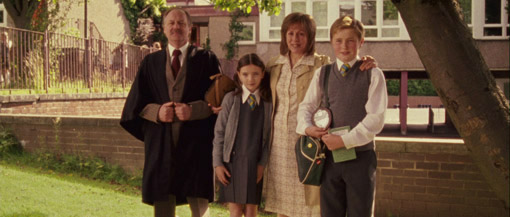
The 'neds' in question are boys who fall under the popular acronym Non-Educated Delinquents, as opposed to the various deviations of the name, including the well-known, Scots' slang for hooligan youth (akin to a chav) or more traditional ties to the Teddy Boy movement of the 1950s. In the case of the latter, it's a more fitting connection, since Neds is definitely an antecedent of the J.D. (juvenile delinquent) films common in the period, and carries with it the same discourse of moral panic that surrounded its cinematic forebears. Mullan began working on the project in the form of a play when he was in his twenties, intending to focus on the prevalence of knife crime. Despite what the press across the land like to suggest with their lurid headlines and prose, one of the many things Neds does is highlight that both gang culture and the presence of knives are not a new phenomenon. Based on Mullan's brief period as a Glasgow gang member aged-14, the story quickly evolved into something bigger.
Always candid about his upbringing ever since he made his acting debut in My Name is Joe, Mullan insists that while Neds isn't an autobiographical film, it is a personal one. When he returned to the project in 2005 with a view to making a film, he stripped away autobiography in the direct sense, but the echoes of it remain. The parallels between the academically gifted John and the young Mullan are obvious, and those with any knowledge of his life will be left wondering if his turn as Mr McGill is based upon that of his late father, Charles (something which Mullan has refused to comment upon).
John's regression from altar boy to thug, as it's so often termed, makes for good reading, and lends the film an extra air of relevance to the modern audience of angry young men (and women). Though it speaks about the 1970s, it certainly speaks to 2011 just as loudly, and it definitely allows audiences to take stock and think about the world they live in, whether they be seventeen or seventy; something which Mullan was keen to achieve when bringing the film to the screen. However, Neds is no preachy tale, nor does it try to justify or pass judgement on the worst of John's behaviour (or that of the other gang members). It's left to us to our own conclusions. These characters seem real, and though John is obviously fleshed out to the greatest degree, there's no moralistic postulating as to whether their actions are a by-product of their upbringing. Many boys who grow up in such environments and are faced with the same situations, turn out as John does, but just as many don't.
Few falls from grace have been as spectacular, as tragic, as painful or avoidable as this one.
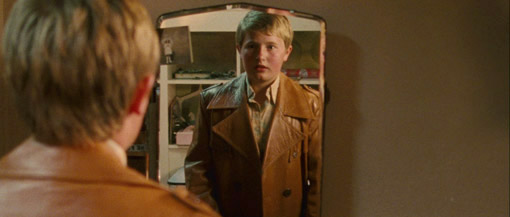
The John we meet at the beginning of the film in 1972 is a shy, sweet-natured eleven-year-old, top of his class and the apple of his mother's eye after winning a prize at school. Thirsty for knowledge, he's determined to better himself, but is constantly thwarted by those around him. John's timid, henpecked mother Theresa and his aunt Beth (Louise Goodall and Marianna Palka respectively, both turning in strong performances both), are his only true supporters. The rest of the world (and even his headmaster) have written him off, believing him destined to turn out the same as his delinquent older brother Benny (Joe Szula), whom John idolises, despite the fact he brings trouble to the house whenever he turns up. The head of the McGill clan (a typically impressive Mullan), is an emotionally cold, abusive drunkard, whose presence in John's life is much like Benny's – both constant and inconstant. Constant in that his tyrannical behaviour pervades all areas of John's life (his presence in any room is like the darkest of clouds, and causes everyone to clam up), and inconstant because he disappears and reappears at random, rifling through drawers and shouting abuse. John takes refuge in puzzles and books, comforting his frightened younger sister Elizabeth (Mhairi Anderson).
All the while you sense he's waiting for the day when he's strong enough to stand up to his father. At the same time, you fear when his breaking point will come, and wonder if he'll be able to pick up the pieces.
The pattern for young John is laid out twofold in the early part of the film and the marks they leave are indelible. Firstly, he's set upon in the playground by an older boy called Canta (Gary Milligan), who warns him that 'big school' is no place for 'swots.' Visibly shaken by the event, John seeks out his brother Benny, who recruits a friend to go along with him and teach Canta a lesson. Later, they bring Canta to John like a trophy, turning to the young boy for what to do next. A kinder soul than Benny, John motions for them to stop, and Canta flees while he's able (it's a decision that will later come back to haunt him). Secondly, after his arrival at secondary school, where he's placed in a class much lower than his ability level, he scores full marks in a Latin test and his teacher Mr Boneti (a wonderful Steven Robinson), wards off any bullying John might suffer by getting all the name-calling in first, but, at the same time, praises his embarrassed young student for flexing his intellect so unashamedly (another teacher continually berates John for his arrogance and lack of respect towards his peers). Both things flag up, in different ways, that while intelligence is often painted as a tool for social mobility – such narratives are common to the point of cliché – in John's case, they only bring about social isolation. Despite this, John continues to achieve good grades, and earns himself a ticket to the top class, 1A1, where he looks set to stay.
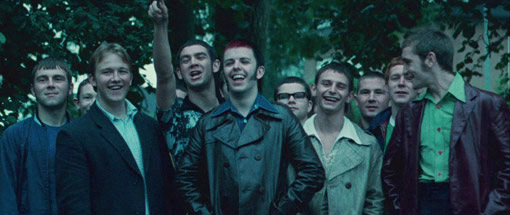
The break, when it comes, is a tiny, innocuous thing that sends him spiralling out of control after he goes to a summer school at the suggestion of his well-meaning teacher, Mr McLeod (Stephen McCole), who's eager for John to keep busy in the summer break and steer clear of trouble. For a while, it works, and John strikes up a friendship with another boy, Julian (Martin Bell). Though they share common ground, Julian's family are wealthy (he attends a fee-paying school), and his mother is wary of John, quizzing him over everything under the guise of bringing the boys refreshments in the garden (every inch the middle-class suburban housewife). When John accidentally breaks Julian's record player as he swishes round a tennis racquet 'like Bruce Lee,' his welcome at the household is subsequently far from warm, and he's sent on his way. Cut off from his friend, he comes across a group of lads in the park, and soon finds himself drinking, smoking and falling into step with their turf wars with a rival gang.
When he returns to school, his attention is diverted, and his attendance begins to drop. His ambitions quickly shift. Now John wants to step out of Benny's shadow in an entirely different way, desperate to prove himself and make it known that he's just as threatening and powerful as his brother. Rather than the 'wee man' who's protected, he wants to stand on his own two feet and act the 'big man' instead – with evermore violent results as the anger he's held in over the years comes pouring out of him; anger at himself for being clever, at his father for his drunkenness, at his mother for her weakness, and at everyone else for all the times he's been bullied him or cast aside.
Every so often, there are flashes of tenderness in the film and glimpses of the boy we know is underneath. That is perhaps the real tragedy of John's descent. Until the very last, we are all painfully aware that John is playing up to what people expect – or rather the little they expect – of him. He finds it's easier to conform, and harder to try not to, so he just gives up on everything, including himself. John's regard for his own life diminishes as the violence between the gangs escalates. Meanwhile, things at home worsen to the point where he takes things into his own hands, with devastating consequences.
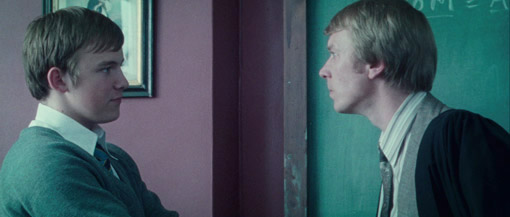
Neds is not a film that expresses itself in broad strokes with overcomplicated dialogue, but instead in details and subtleties which reinforce the naturalism achieved by using a cast of unknown young performers coupled with improvisational techniques. What we see is just as important as what we hear, but sometimes silence says more than words ever could, and McCarron's performance is both measured and quiet, furious and intense as required. It's an impressive feat for someone of McCarron's age and experience (he was just sixteen at the time of filming); a trait which is shared by many of the younger members of the cast. Given the film's subject matter, and the fact that Mullan found McCarron at an open casting call, inevitable comparisons have been drawn between Neds and Shane Meadows' This is England and the discovery of Thomas Turgoose in much the same manner. Despite obvious similarities such as the period setting and approach to the material, Neds is by no means This is Scotland.
Though Mullan uses many of the tropes common to social realist cinema, such as the casting of unknowns and improvisation, he shows, in no uncertain terms, that he's not afraid to tear up the rulebook of that tradition either, regardless of how those changes will be perceived (early reviews from the English press in particular reacted unfavourably to Mullan's choices, and his defence of them was typically vocal). I won't reveal exactly how far Neds strays toward the strange and the absurd when it enters into the mind of an increasingly lost and lonely John as he reaches the end of his rope, because it would undercut the power of the scene completely, but the result onscreen is both surprising, inventive and, in it's own way, realistic. While the sequence may not fit into the realist mould, it does fit with John's state of mind and is reflective of his truth at that given moment. For that, Mullan should be applauded, not chastised.
In fact, Neds owes as much to Stanley Kubrick and Sam Peckinpah as it does to Mike Leigh, Ken Loach or Bill Forsyth, but instead of these influences clashing with each other, as you'd expect, they mesh rather seamlessly to create a rich tapestry on screen, acting both as a reflection of the period and as indications of who Mullan is inspired by.
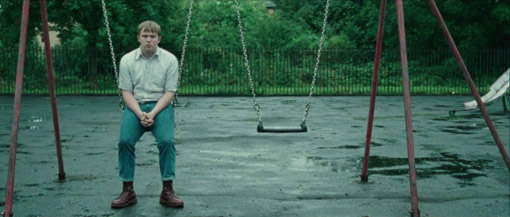
For a film full of polarised attitudes and behaviour, in its look and feel, it's entirely unified. This is one of few films that manages to capture its period; not in that flashy, knowing, self-referential way, where it looks like the characters are playing dress-up and working their way through an 'I love the 1970s'compilation album, but in a rather more authentic way that can only be drawn from memory. Of course, there is popular music in here, like the uses of Sweet and T-Rex peppered throughout, but where it really excels is in the less overt moments of memory, such as the programmes young John watches, where the camera lingers momentarily on the McGill's television as The Adventures of Robinson Crusoe and World of History play on.
The influence of Peckinpah and Kubrick, in particular, come across in the film's shooting style to give, as Mullan puts it, 'a flavour of the period,' but they're also indicative of Neds' presentation of violence, and the relationship between sound and image. It'd be remiss of me not to mention A Clockwork Orange here, because the correlations between the two are obvious. In a standout scene, when the rival gangs storm across a bridge and enter into a mass brawl, Irving Berlin's 'Cheek to Cheek,' rises up on the soundtrack. Just as Beethoven did for Kubrick, the virtuosic beauty of the music sharply contrasts with that of the unfolding violence and makes for a clever weapon of choice.
Make no mistake, Neds is a bloody film and doesn't shy away from depicting violence, which has earned it an 18 certificate, potentially barring the very section of society who should be able to see it, but that's another article in itself. Censorship laments aside, I'd argue that there's no glory in seeing the boys scuffle and scream. Furthermore, Mullan certainly shows the consequences of such attacks. The price paid is high. There's no rescue, no uplifting redemption and no real answer. Since we've gotten to know John so well, that's hard to bear, but it's also the right way to end things. Neds opens a momentary window on John's his life, and like the people he crosses paths with, we're only privy to it for a short time. In the end, he leaves us, a tiny retreating figure, disappearing from view and all we're left with is the hope that he'll be OK.
It's perhaps inevitable that when approaching a home video version of a film that has been described as 'gritty', the expectations for the picture quality lower a little, fueled perhaps by memories of early neo-realist use of hand-held cameras and high grain film stocks. To some extent eOne's Blu-ray of Neds plays to these preconceptions – film grain is visible, the colours are (deliberately) muted, and the image is never as eye-poppingly sharp as the format allows. But it does feel right for the film's tone and setting, and effectively evokes the period without resorting to the current fondness for excessive colour filtration. It may well be the result of post-production colour timing, but Neds actually feels like it was shot in the 70s on fine grain colour 16mm film stock. The contrast can vary depending on lighting conditions (darker scenes can see detail pulled into the shadows), but in brighter scenes there is a pleasing gentleness to the tonal range that is again consistent with film stocks of the period. As you would expect from a transfer of a modern film, the image is spotless throughout.
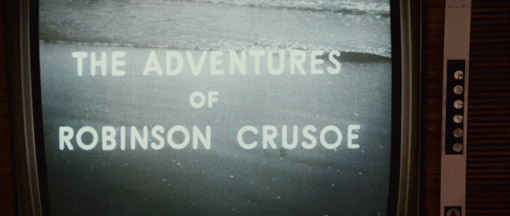
Both Dolby Digital stereo 2.0 and DTS-HD Master Audio 5.1 surround soundtracks are on offer, but the difference between the two is not as obvious as you might expect. After listening to both tracks it seems likely that the film was actually mixed in stereo, as even on the DTS track there is little if any specific use of the surrounds, and the dialogue sits firmly at the front and centre. Where both soundtracks come to life is when the music kicks in, which is clear, bright and punchy without drowning out the dialogue.
The neat little package of extras that accompany the film make for a fine release. The subtitles option comes in handy during moments where the dialogue is unintelligible, especially if you're unused to the Glaswegian accent (something memorably dealt with by burned-in subtitles during the early scenes of Sweet Sixteen).
Deleted Scenes (17:55)
An interesting little collection of scenes cut from the film, presented without commentary (which it would benefit from), all on the same track. Most of these are incidental scenes cut from larger ones, such as John's mother talking to the headmaster's secretary as they wait for an appointment. Others, though, shed light on other aspects of John's character, such as those connected to his relationship with older brother Benny. The real star of this is also the longest uninterrupted scene, an alternate/extended take of a session during John's time at a summer school, where an enthusiastic PE teacher explains the rules of playing baseball. Though an obvious casualty of cut for time and tone, it's great to watch in isolation.
Peter Mullan Masterclass (22:48)
Filmed at the London Film Festival in 2010, hosted in association with the National Film and Television School and The Script Factory, this Q and A with Mullan and broadcaster Peter Curran is a real treat and covers a broad range of topics. As you'd expect, the main focus here is Neds, including an exploration of how the project came into being and the difficulties of writing and filming material. The second half of the discussion is dedicated to the stylistic and cultural influences Mullan drew on while making the film and his experiences of working with young actors.
With both men on fine form, this discussion is fascinating to watch, not least because of the dual actor-director focus Mullan brings to the session and the obvious passion he has for his work.
Note: There are some clips of Neds included to reinforce Mullan's comments, but they don't give away too much of the plot, even if you're coming to the film fresh. In fact, you're likely to have seen them if you caught any of the press coverage around the time of the film's release.
It's worth noting that this extra is actually a cut down version of the one you can still see in its entirety (minus the film clips, due to copyright issues) on the BFI web site here.
Neds is without doubt Mullan's best work to date. Gripping and honest to the point of brutality, it's an incredibly powerful film that will stay with you for a long time to come. Highly recommended.
|